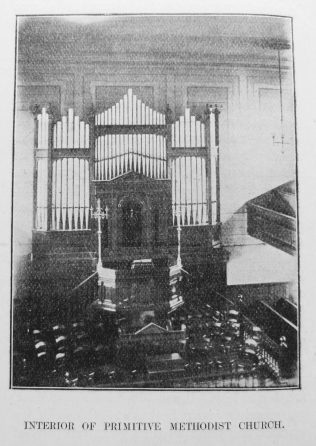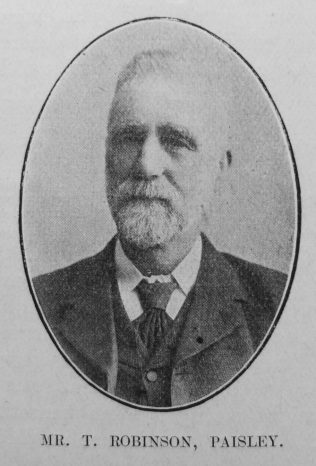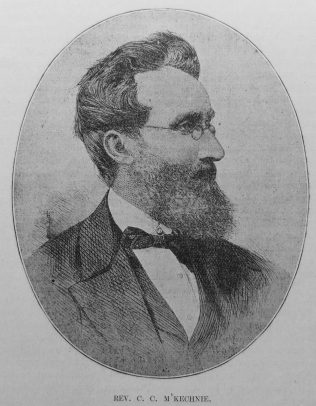Paisley Primitive Methodist Worthies
Primarily Colin Campbell M'Kechnie and Thomas Robinson






Transcription of Article in the Primitive Methodist Magazine by J.P. Langham
The spiritual home of Colin C. M’Kechnie and Thomas Robinson is worthy of honourable mention. It has given to Primitive Methodism one of its most distinguished Presidents, and one of its most genial Vice-presidents, and has sent forth a stream of Godly people to all parts of the world, who have been faithful in their new homes to the traditions of their mother church. From the scanty circuit records, little can be gleaned about the heroic past, and of the illustrious company of early workers but few remain on this side the veil. Philip Maddocks, who is nearing the end of his ninth decade, still recalls with joy his residence in Paisley over forty years ago. At the last prayer meeting he conducted in the old Philosophical Hall, which adjoined the Abbey church, thirteen converts were the crown of his rejoicing. One of them afterwards became Mrs. Thomas Robinson of Hurlet, whose hospitality a great host of people from all parts of the world have enjoyed. It was during his term in Paisley that Motherwell was missioned, and he preached the first sermon in what has long been one of the best Scottish circuits. To speak of Mr. Maddocks’ ministry is to speak of ancient times, but he came to the town nearly thirty years after the first missionaries from Glasgow, by their open-air work, awoke the wonderment of the staid inhabitants of “Seestuu.” They came singing through the streets, a startling violation of Scotch propriety, and, what was more outrageous still, they sang hymns to song tunes. The church precentors, who regarded the Scotch metrical version of the Psalms as divinely given for use in worship, and looked upon hymns as an invention of the profane, were shocked and grieved to the heart; but the common people flocked to their windows or to the ends of the “closes” to listen to the “Methodies.” One Sabbath morning, in the neighbouring town of Johnstone, Mrs. M’Kechnie, the mother of Alexander, who afterwards entered the P.M. ministry, was preparing breakfast for the family, when she was startled by the sound of singing in the streets. Throwing down the porridge spoon, she said, “You can get breakfast for yourselves, I’m off to hear the Methodies.” From that day the fortunes of that family were linked with our church. The early P.M. missionaries in Scotland were indeed “singing pilgrims,” who taught the Scotch to sing hymns. They were the heralds of musical reform, in whose steps an army of sweet singers soon followed. Now nearly all Scotch congregations sing hymns, and organs are almost as numerous as tuning forks once were. They were also amongst the first advocates of total abstinence, in a land where whiskey drinking was even more firmly established than the church. The ministers and elders at ordination dinners and Presbyterial gatherings cemented their friendship with whiskey and wine; and to question their use would have been as impertinent as to question the authority of the Westminster Confession. The teetotal Methodies seemed to staid Scotch people as absurd as a vegetarian among gourmands, who count that day wasted that is not crowned with an eight course dinner. The question of total abstinence was the occasion of trouble very soon after the introduction of Primitive Methodism to Paisley.
The first report of the Circuit, 1838, states that all the officials, with six exceptions, are teetotalers. But five years after, difference of opinion on this subject ripened into strife and terminated in division. The report of 1843 says: “We’ have had a division. Some who professed to be great friends of the church became enemies. They were what may be styled ‘imprudent advocates’ of total abstinence. We did all we could to meet their views; but when they wished to make new rules, such as, ‘no one should he an official except ‘pledged teetotallers,’ we felt it our duty to demur. They then left and did all they could to bring the society into disrepute.” That the “imprudent teetotallers” had some good ground for the attempt they made to make new rules, is evident from the minute of the following Quarterly Meeting, only three months after the teetotal zealots left, “The sinking of our circuit has arisen since March, chiefly from the improper use of ardent spirits by many of the members.”
After sixty years the Conference itself has ordained that “no trafficker in intoxicating drinks shall he received as an approved member.”
This is another illustration of time’s revenges. The place of meeting at this time was the Philosophical Hall, already referred to; and here some strange scenes were occasionally witnessed. From its pulpit John Snowdon and others were publicly excommunicated, “because they had gone and got themselves dipped by the American Baptists and otherwise disturbed the peace of the church; ” and within its walls private and social disputes were settled by an ever watchful circuit committee. At this court steps were taken to minimise the national love of argument, and hearers were “forbidden to start any objection or ask any question during divine service.” Doubtless this tended to order, but probably the meetings were far more interesting when the preacher was exposed to a running fire of questions, or cannonaded with scathing comments. Probably the modern complaint that preaching is so uninteresting, would cease if questioning the preacher during sermon time were permitted. Preachers would seldom grow prosy, if they knew that at any moment some astute hearer might spring a mine beneath their feet, and make a great breach in their oratorical defences. Empty verbiage would fly the pulpit, which was the centre of dialectical attack.
The prevailing method of spiritual instruction tends to degeneracy in pulpit and pew; the hearers become absorbing sponges with but little reactive virtue; and the preachers become mere declaimers or dreamers, without a tinge of the inspiration which provokes to love and good works. It was about this time that Colin M’Kechnie joined the infant society, and was soon thrust out into the work of the ministry.
In June, 1838, he crossed the border to become a travelling preacher in the Ripon circuit. A mere lad in jacket and cap, he set out for his distant field of work, to undertake toil which might have made at strong man shrink. The house in which, at a cottage meeting, he preached his first sermon, still stands, but the hall whose very atmosphere seemed to engender controversy, has long been demolished. Possibly, the fact that he was born in a town, celebrated at that time for “brainy” men, and converted in a hall devoted to philosophical disputation, where the even tenor of the sermon was punctuated by questions and criticism, may account in some measure for the trend of his mind to intellectual and metaphysical pursuits. As he left the circuit within twelve months of its formation, it is not surprising that his name only appears twice in its books; nor that tradition is almost silent concerning him. All that can now be done, is to get a few faint glimpses of the spiritual environment out of which he sprang. The church of his spiritual nativity seems to have taken a rather wide view of its powers and functions; for it did not confine itself to the proclamation of the simple gospel, but dealt occasionally with social questions. It ventured once to intervene between master and man. John Lamb, an apprentice, for some unrecorded reason, left a web unfinished in his master’s weaving shed, and put his employer to great inconvenience. For this dereliction of duty he was summoned before a circuit committee, and judicially forbidden to “exercise in public” for two months. The church evidently believed its jurisdiction extended to the private life of the members, and strove to lift that life to the level of the Golden Rule. Perhaps in this it attempted the impossible.
The church which undertook to deal with deserters of unfinished webs, took a stern and somewhat narrow view of life. The life of man was an ever quickening tramp to the grave, and his chief business “to flee from the wrath to come.” A very narrow circle of prayer, praise, Bible reading, and meditation, bounded all that was legitimate to a Christian. The minister was commissioned to reprove Brother Hare, for going to a “penny reel,” and thus causing the uncircumcised to blaspheme. No staid Methody would think of perilling his soul amid the vanities of the annual fair, and even the songs of the pure-lipped Tannahill were to them “anathema maranatha. ”
One of the members kept her shroud in constant readiness, and duly bleached it year after year, that she might with decency retire to her last home.
The fear of death and the terror of judgment invested their lives with a sombreness which stifled levity and jeopardised joy. But there were wondrous compensations. The assurance of future bliss, the anticipation of heavenly raptures, the concentration of thought on Jesus – until He became a daily companion, amply repaid for the loss of fleeting pleasures. Those who have frequent vision of the life “within the veil,” can easily resign their share in the ephemeral joys of surface existence. An instance may here be given of that “fellowship of saints,” which constituted such a controlling force in the lives of that day. It is given as an illustration of the permanence of spiritual friendships.
Duncan McLaren, who was superintendent of the South Necropolis, Glasgow and Sandy Baird, of Paisley, were close friends.
At the same time they drew near to the end of life; both lay upon a sick bed; and both were feeling after the trusted friends of yore. Neither knew of the other’s condition. The day before Duncan McLaren died he fell into a sweet sleep, from which he awoke with pleasurable excitement. He called his daughter and said to her, “I have had such a pleasant dream. l thought the time of my departure had come, and the angels were ready to hear me away; and foremost amongst them was my old friend, Sandy Baird.” The next day a letter came to say that Sandy had passed within the veil at the very time his friend had seen him in his sleep. Soon after the reception of the letter, Duncan went to join his friend. Professor James and Sir Oliver Lodge would call this a case of “Telepathy”; but we look on it as a confirmation of the ancient Christian faith, “I believe in the communion of saints. . , . and in the life everlasting.” Verily the communion of saints is a blessed reality.
While the chief actors of the past seem dim shadows to modern eyes, there lives and works to-day one of the chief builders of Paisley Primitive Methodist Church – Thomas Robinson, of Hurlet. He is one of the fruits of the great Irish Revival, the fame of which encompassed the world. In his early days he found a living on the sea.
For refusing to sail in an unseaworthy ship, he and his mates were thrown into gaol, where he tasted the severity of prison discipline, During his incarceration he brooded over the manifest injustice of his lot, and pondered upon ways of revenge. He longed to wreak vengeance on the man through whose tyranny he had been imprisoned. He left the prison with the intention to find and slay him. But ere his evil intention bore fruit he met with the Saviour of men. The realised love of Jesus filled him with love to all men, even the man who had occasioned his most grievous experience. Now he felt that he must seek his old foe, not to slay, but to save him. Though he found him keeping a drink shop, he determined to win him for his Master. So great was the transformation in himself that his old oppressor was fain to believe in the reality of conversion, and was fairly carried off his feet by the persuasive eloquence of the young convert. Soon he also was numbered amongst the redeemed. His instructor in the ways of God went forth into the world with the joy of the deliverer in his soul, instead of the guilt of murder on his conscience. Ever since then it has been his joy to point men to “Him who is able to save to the uttermost all that come unto God by Him.”
For forty years he has gone in and out amongst the people of Paisley and Glasgow with a stainless reputation. Men speak of him as a fanatical teetotaller, but a jolly good fellow for all that. He has given unstintingly in labour, time, and money, to the church of his choice, and has long been the acknowledged lay leader of Scottish Primitive Methodism. Once long ago he went to a missionary meeting with the price of some new clothes in his pocket. Ere the meeting was over he emptied his pockets into the plate, and determined to wear his shabby suit some time longer. At a great meeting over which he presided, he narrated the incident, and claimed that he had once given all he had to missions. A man in the audience shouted out, “You daren’t do it again.” He enjoyed the retort as much as any one in the meeting. The church at Paisley is under continuous obligation to him for loving service and generous help. The splendid organ which so greatly aids in the worship of praise was the gift of his wife. Still he finds time and ways to serve connexional interests far and near. His name has long been a household word throughout the length and breadth of our Zion.
To the quiet, unobtrusive co-operation of his wife he owes very much. She has made his home a refuge where he can forget his cares, and renew his strength. The words of king Lemuel truly describe her.
“Who can find a virtuous woman? for her price is far above rubies,
The heart of her husband doth safely trust in her. . .
Her husband is known in the gates, when he sitteth among the elders of the land. . .
She looketh well to the ways of her household, and eateth not the bread of idleness.
Her children rise up and call her blessed; her husband also, and he praiseth her.”
To his initiation Glasgow third circuit owes its being, and to his co-operation all the Glasgow churches are much indebted. Just now he is one of the leading figures in the Temperance world; for he is the working president of the Scottish Permissive Bill Association, an organisation which is doing much to grapple with the drink curse.
Of other worthies who have done much to build up the Primitive Methodist Church in Paisley I have not time to write. This outpost of the Primitive Methodist Church has fully justified its existence, by having permeated a Scottish town with Methodist ideals and practices; by leading the van in Temperance reform; and by giving Colin Campbell M’Kechnie and others to the church’s wider ministry.
“The memory of good deeds will ever stay,
A lamp to light us on the darkened way,
A music to the ear on clamouring street,
A cooling well amid the noontide heat,
A scent of green boughs blown through narrow walls,
A feel of rest when quiet evening falls.”
References
Primitive Methodist Magazine 1905/114





No Comments
Add a comment about this page